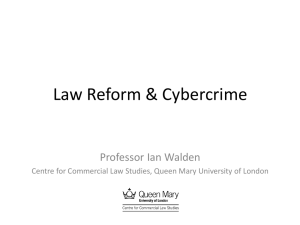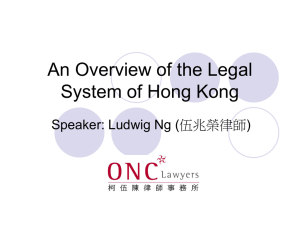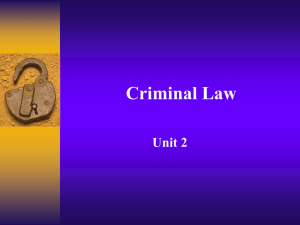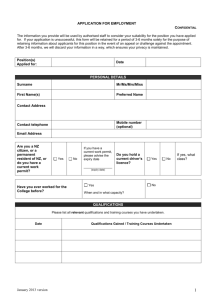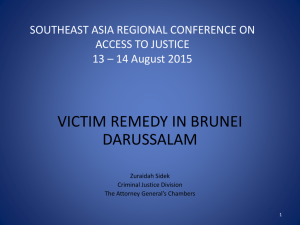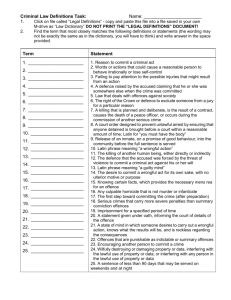(c) crown copyright Catalogue Reference:CAB/129/67 Image Reference:0021
advertisement
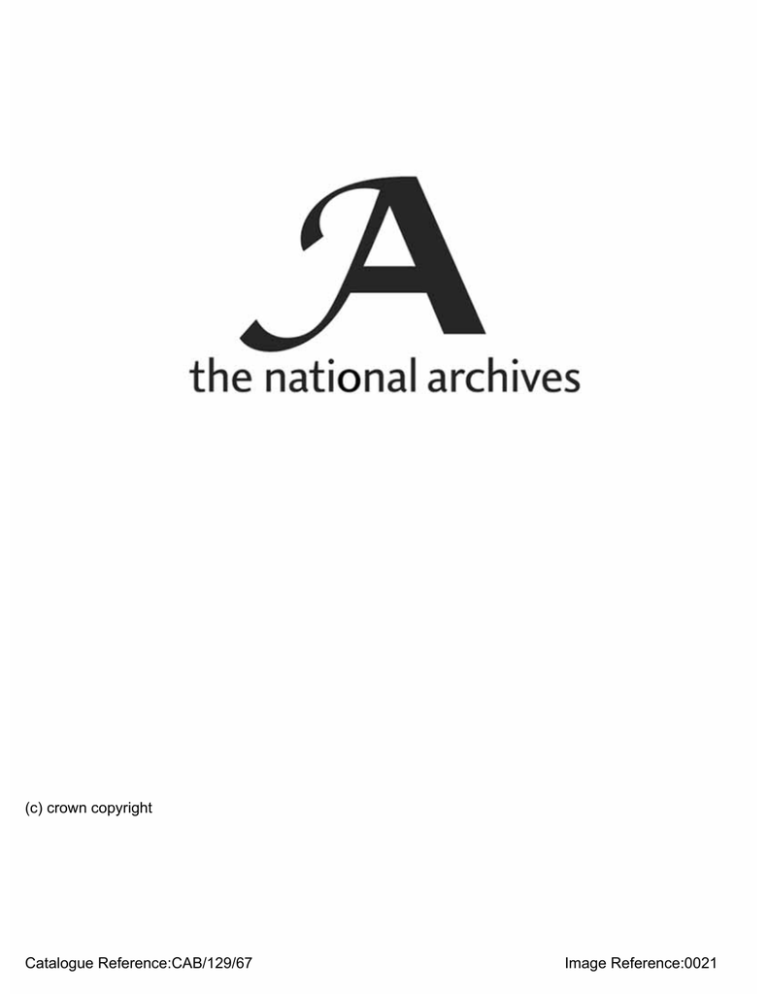
(c) crown copyright Catalogue Reference:CAB/129/67 Image Reference:0021 Printed for the Cabinet. CABINET OFFICE RECORD COPY SECRET C . (54) 121 1st April, March 1954 C o p v N o ' 1954 CABINET RESTRICTIONS ON REPORTING F O R H O M O S E X U A L OF PROCEEDINGS OFFENCES MEMORANDUM BY THE SECRETARY OF STATE FOR THE HOME DEPARTMENT AND MINISTER FOR W E L S H AFFAIRS The Cabinet, at their meeting on 17th March, invited m e to submit a memorandum summarising the arguments for and against legislation designed to restrict publication of the details of criminal prosecutions for homosexual offences (C.C. (54) 20th Conclusions, Minute 4). 2. Section 1 of the Judicial Proceedings (Regulation of Reports) Act, 1926, makes it unlawful (a) to print or publish " in relation to any judicial proceedings any indecent matter, or indecent medical, surgical or physiological details being matters or details the publication of which would b e calculated to injure public morals," and ib) without prejudice -to the foregoing prohibition, t o print or publish in relation to matrimonial proceedings anything beyond the names, addresses and occupations of the parties and witnesses; a concise state­ ment of charges, defences and counter-charges in support of which evidence has been given; submissions of law and the decision of the court thereon; and the summing-up, the finding of the jury (if auy) and the judgment and observations of the judge in giving judgment. 3. The provisions set out in paragraph (a), which substantially reproduced the effect of the then existing law, already prohibit the publication of indecent matter in reports of criminal proceedings. I take it that there is no suggestion of holding trials for homosexual offences in camera, or of prohibiting any reference to them in the Press; and the issue seems in effect to be whether provisions similar to those in paragraph (b) should be extended to criminal trials of this kind. 4. The arguments in favour of such a course are: — (i) that the publication of full and detailed reports of these unsavoury cases panders to the salacious reader, may corrupt the innocent, and is in general injurious to public morals; (ii) that sensational accounts of criminal offences may lead to their imitation by others; and (iii) that the amount of space devoted by the Press to some notorious cases of this kind may give rise to exaggerated ideas of the prevalence of homosexual vice and that restriction of Press reports would tend to allay public anxiety. 5. The arguments against the proposal a r e : — (i) Any restriction on the liberty of the Press can be justified only by a clear and compelling need in the public interest; but the sensational treat­ ment of an occasional notorious case is exceptional, and the majority of such cases are reported briefly, if at all. 45962 (ii) There is a vital difference between reports of matrimonial and of criminal proceedings. Matrimonial proceedings are a civil matter between the parties. Criminal proceedings relate to an offence against the State and against the community and affect the liberty of the subject. The question of applying to certain criminal offences the same principle in regard to publication as in divorce cases was considered when the Act of 1926 was before Parliament, and was rejected. (iii) If such restrictions were to be imposed, it would be difficult to justify a distinction between homosexual offences and other sexual offences, or, for that matter, offences such as murder, which are not in themselves of a sexual nature, but are often closely connected with sexual offences or with allegations of sexual misconduct. (iv) The publicity given to the preliminary proceedings before examining Justices sometimes leads to witnesses coming forward who can give evidence of value to the prosecution or the defence. Curtailment of reports at this stage might therefore be prejudicial to the administration of justice. (v) It is in the public interest that cases of this kind, however unpleasant, should be reported, so that everyone may know that conduct of this kind is an offence against criminal law and may realise what is the punishment for committing that crime. When trials for incest were heard in camera cases not infrequently came before the courts where the accused were unaware that their conduct was an offence against the criminal law. (vi) If such legislation were now introduced by a Private Member and accepted by the Government, and at the same time the Government announced that they did not propose to undertake any inquiry into the law relating to homosexual offences, it would be said that the Government had not merely declined to hold an inquiry, in spite of the great and unexplained increase in such offences and of the fact that the existing law was regarded as unsatisfactory by many responsible people, but were endeavouring to suppress the publication of evidence which showed the need for an inquiry. 6. In my judgment the objections to legislation on the lines suggested outweigh any possible advantage. D. M. F . S.W.1, Home Office, 31st March, 1954.
